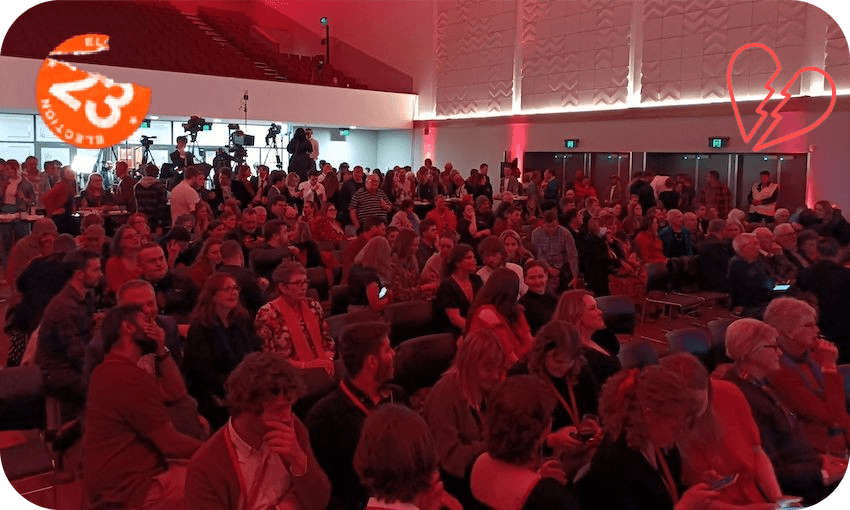The saddest nights in politics happen when expectations don’t quite line up with reality. As the saying goes, it’s the hope that kills you.
The Labour Party party at Lower Hutt Town Hall certainly wasn’t a jubilant night, but it wasn’t quite as depressing as it could have been. Mostly because there was barely any hope to begin with. No one even bothered to buy any red balloons.
Hardly anyone was really expecting a Labour government to emerge tonight. A late sign of momentum in the polling and two good debates from Chris Hipkins were just enough hopium, but that got extinguished fast.
The room was still mostly empty when the first votes were reported at 7pm and it became clear that National had slightly over-performed their polling. There were genuine gasps when the first results came up for Wellington Central, showing the Greens’ Tamatha Paul with more twice as many votes as Labour’s Ibrahim Omer.
If there was a silver lining, it’s that it probably improved the vibe of the party. By eliminating all hope, people could get on with the serious business of drinking.
By 8pm the bar was going crazy. People rushed around with bottles of wine and three beers per hand. The food situation flipped back and forth faster than the party vote in Hutt South. One moment it was trays of sausage rolls and sandwiches, then they would be replaced by charcuterie and cold seafood salads, only for the sausage rolls to be back again in the blink of an eye.
Filling up with booze, the crowds started to clog up the aisles, drinking and chatting to forget their results unfolding around them. It was almost impossible to get around until people mercifully took their seats to settle in and watch the TV coverage. The mood in the room was mostly sad resignation, but it took a sharper turn towards depression as news circulated that the Australian Voice referendum has lost.
At around 8.30, we heard the first big cheer of the night. Journalists looked around frantically, trying to work out what had happened. “I’m going to get my tits out,” someone said slightly too loudly in a possibly unrelated conversation.
It turns out the room was just reacting to the TV showing Chris Hipkins ahead by several thousand votes in Remutaka. It’s a low bar when you have to celebrate your own leader holding an overwhelmingly safe seat, but there wasn’t much else to cheer for.
Labour MPs and candidates were barely anywhere to be seen. Greg O’Connor was the rare exception: he was the first to arrive and was happy to talk to anyone and everyone as his win in Ōhāriu became increasingly clear. Ayesha Verrall and Ginny Andersen made the rounds but spent much of the night outside the main room. Grant Robertson took one for the team and fronted up for the only major interview of the night, conceding that there was a “mood for change” in the country.
With most of the crowd now in their seats and intently watching the results roll in, the party faithful grew increasingly bitter. There was a round of boos for Chris Bishop when he appeared on screen. No one could actually hear what the Bish was saying.
At this point, the catering switched to desserts, a sign the night was nearing its end.
Maybe sensing he needed to do something to fix the vibe, party secretary Rob Salmond hopped up on stage to deliver an important update on the prime minister. “He is getting changed,” he said.
Surprisingly, that did little to improve the party’s mood. The boos started to get deeper and louder, first when John Key appeared on the TV heading into the National Party event, and reaching a crescendo when it cut to David Seymour. “Fuck you, racist prick,” a voice from the crowd yelled.
Mercifully, Chippy came to the rescue. When the first shots of the party leader walking from his car to the hall appeared, the room erupted in chants of “Chippy, Chippy, Chippy”.
Party president Jill Day emerged first, wearing a black dress and a very serious face. After the typical introductions and commiserations, she introduced “a boy from right here in the Hutt, Chippy”.
Hipkins got another round of Chippy chants as he made his way to the stage. He thanked volunteers for the campaign, and confirmed he had called Christopher Luxon to congratulate him on the National Party’s results. “Labour is not in a position to form a government,” he conceded.
“When the tide comes in big, it goes out big. But the Labour Party is still here, we’re not going away, and we will get up again like we have many times before.”
Then, the biggest moment of the night. As he neared the end of his speech, he started to thank his family before stopping himself, tearing up and looking away. In an instant, everyone in the room was out of their seats with the biggest standing ovation of the evening and another round of “Chippy, Chippy, Chippy”.
When he composed himself, he thanked his parents and added a special thanks for “someone most of you don’t know, my partner Toni”.
This was the first time Hipkins had mentioned having a new partner, and his fans were shook. There were open jaws. Labour Party rosettes waved back and forth as volunteers and staffers swivelled their heads, trying to work out if anyone know about Toni – or was it Tony? Did the prime minister just come out? (A Labour Party staffer quickly confirmed to media that Toni is spelled with an i).
With that final bombshell, the party was over. Chris Hipkins descended the stairs and headed out the door into the beautiful cool night air of Lower Hutt. The food was gone, the drinks were gone, the Labour government was over. The party faithful were herded onto buses and sent packing back to Wellington.
Follow Gone By Lunchtime on Apple Podcasts, Spotify or wherever you listen to podcasts.





